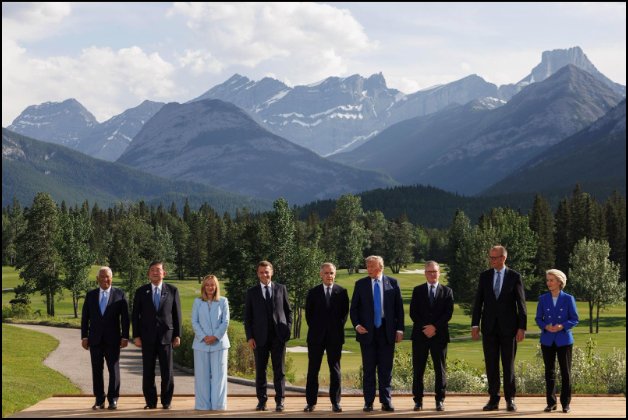Against the backdrop of tense economic relations and the Trump Administration’s isolationist approach to foreign policy, this year’s G7 Summit became a bellwether for assessing each member countries’ priorities and shifting relations. According to news coverage of the event, the decision to scrap the G7’s usual group-wide leaders’ communiqué—in favor of six, more focused joint statements—signaled a lack of unity among the current leaders. Additionally, leaders such as Canadian Prime Minister Mark Carney and UK Prime Minister Keir Starmer appeared to be using the summit as an opportunity to gain favorability with Trump. Carney allegedly modified the agenda to avoid topics that the Trump Administration would deem as controversial, and Starmer set up a bilateral meeting in order to finalize a trade deal with the United States. Still, despite the apparent lack of unity and the overwhelming focus on the leaders themselves, the 2025 G7 Summit is helpful for pinpointing current concerns and areas of interest for the member countries.
Overall, the summit signals that even as G7 members look for new economic partnerships, they continue to be wary of Chinese aggression in the Indo-Pacific and prioritize like-minded partners in industries such as critical minerals. Additionally, the summit’s concluding statements show a strong interest in artificial intelligence (AI), quantum innovation, disaster response, countering foreign interference, and fighting transnational crime—all areas in which Taiwan can contribute.
Before the Summit
Even before the summit took place, the G7 already took a strong stance in support of peace and stability in the Taiwan Strait. Following the March 14 meeting in Charlevoix, the G7 foreign ministers released a joint statement that “emphasized the importance of maintaining peace and stability across the Taiwan Strait,” and encouraged “Taiwan’s meaningful participation in appropriate international organizations.” Reuters also noted that the statement did not contain any reference to “One-China” policies, which was a break from past G7 statements. A spokesperson for the People’s Republic of China’s (PRC) foreign ministry criticized the G7 a few days before the summit and warned the countries to “stop interfering in other countries’ internal affairs, stop undermining other countries’ development, (and) stop manipulating issues related to China.” The G7 Summit offers an opportunity for the members to speak with a united voice, which also plays a role in deterring China—an opportunity that would naturally be lost if China ends up joining the G7 in the future.
Going into the summit meeting in Kananaskis, Prime Minister Carney stated that the summit would focus on: peace and stability; energy security and digital transition; and economic partnerships. Across these areas, economic security and development was a through-line between many of the topics, and analysts indicated that Carney likely invited Indian Prime Minister Modi to attend with the hopes of diversifying Canadian trade relations. As many countries reevaluate their trade relations—particularly their relations with the United States—the PRC has discussed strengthening trade relations with France, Canada, and Japan to varying degrees of success. In the week before the G7 Summit, the United States also held trade talks with the PRC.
Simultaneously, concerns over PRC military aggression have led many of the G7 members to take a stronger stance on defense, to include support for de-risking supply chains. To counter China’s increasingly aggressive posture, Japan increased defense spending by 21 percent in 2024, to a total of 1.4 percent of its gross domestic product (GDP). In 2023, Italy also withdrew from China’s Belt and Road Initiative (BRI, formerly known as “One Belt, One Road,” 一帶一路) due to “unmet promises and the country’s strategic reassessment of China.” Therefore, while some countries may be interested in increasing trade relations with China, many still have concerns about the PRC’s reliability as a partner and its security liabilities. In comparison, Taiwan has proven to be a reliable, likeminded ally, with Taiwan and Canada both endorsing a “Collaborative Framework on Supply Chains Resilience.”

Image: G7 Leaders pose for a photo at the 51st G7 Summit in Canada. (Image Source: Flickr via Wikimedia Commons.)
G7 Statements and Opportunities for Taiwan
In addition to broader geopolitical concerns raised before and during the G7 Summit, Prime Minister Carney also posted a series of joint statements upon the summit’s conclusion, which focus on the specific areas below.
Critical Minerals and Supply Chains
In the G7 Critical Minerals Action Plan, the G7 leaders highlighted three main areas for future collaboration: building standards-based markets, mobilizing capital and investing in partnerships, and promoting innovation. Despite lacking domestic reserves of critical minerals, Taiwan is a significant player when it comes to downstream processing and high-tech manufacturing. In particular, rare earth elements (REEs) are key components in semiconductor production, making Taiwan’s semiconductor industry extremely vulnerable to any critical mineral supply chain disruptions. Not only does Taiwan have a vested interest in making supply chains more resilient, but Taiwan’s private sector and non-profit organizations are already conducting research on ways to make the critical minerals economy more sustainable. While the Taiwan Semiconductor Manufacturing Company’s (TSMC, 台灣積體電路製造股份有限公司) inclusion in SEMI’s Supply Chain Management Initiative is a positive step, Taiwanese representatives should be invited to pivotal conferences, such as the upcoming Conference on Critical Materials and Minerals in Chicago. At the same time, Taiwanese companies and organizations should prioritize international partnerships—especially with G7 countries—when conducting research on critical minerals and when making investments. For instance, increasing investments into Quebec’s critical minerals industry would both help Taiwan decrease its dependence on Chinese REEs and strengthen relations between Taiwan and Canada.
Artificial Intelligence and Quantum Innovation
Similar to the G7 Critical Minerals Action Plan, the G7 leaders’ statements on AI for Prosperity and a Common Vision for the Future of Quantum Technologies represent an overall goal of innovating with trusted partners. Particularly under AI, the G7 statement outlines several factors as part of their AI adoption roadmap, including: accelerate AI readiness and competitiveness, develop an AI adoption blueprint, expand G7 talent exchanges, and to unlock AI-opportunity. In terms of quantum technology, the statement outlines the intention to “create a trusted ecosystem to manage risks and unleash innovation” through international collaboration. In the fields of both AI and quantum technologies, the Taiwanese government, private sectors, and civil society would be ideal partners that share the values and interests of the G7 countries, while also having a strong technology industry. In 2021, Taipei committed to investing NTD 8 billion (USD 288.2 million) in quantum technology from 2022-2026. The Executive Yuan also announced that they will reveal a new program later this year, which will focus on cultivating Taiwan’s capabilities in “intelligent robots, quantum technology, silicon photonics and ‘sovereign AI.’”
In addition to government programs, Taiwan’s National Center for High-Performance Computing announced that a new AI supercomputing system—built by ASUS and powered by NVIDIA—would be operational at their center in 2025. While the supercomputer is not a quantum computer, it will improve Taiwanese researchers’ ability to produce research on quantum technologies. Moreover, the project positions Taiwan as an emerging hub for quantum technology research, and makes it an attractive partner for future international collaborations on AI and quantum technology. As Taiwan continues to expand its AI and quantum technology capacities, Taiwanese partners would be ideal participants for G7 initiatives that focus on AI and quantum technology. Since G7 working groups, such as the G7 Joint Working Group on Quantum Technologies, are limited to G7 member countries, cooperation with Taiwan should be pursued through alternative methods. For instance, Taipei could host parallel events that are in conversation with the objectives of G7 Working Groups, or G7 members could pursue bilateral or multilateral cooperation with Taiwan outside of the G7 framework.
Countering Foreign Interference
Taiwan’s civil society has developed robust strategies to counter foreign interference as a target of PRC gray zone and information operations. Additionally, these strategies can act as lessons learned for other countries who are bolstering their own efforts to counter foreign interference. As independent researcher Sze-Fung Lee has pointed out, Taiwan’s decentralized model of countering disinformation can be used as a foundation for improving current efforts to counter foreign interference, including in the G7 Rapid Response Mechanism (G7 RRM). The recent G7 Leaders’ Statement on Transnational Repression listed specific ways in which the G7 intended to build upon the G7 RRM, including the launch of a Digital Transnational Repression Detection Academy “to build collective capacity to detect [transnational repression] online” and highlighting the need to increase cooperation with like-minded partners. Taiwanese organizations—such as Doublethink Lab, Taiwan Information Environment Research Center (IORG), and Taiwan AI Labs—should be included within these new initiatives. Not only do these organizations have substantial databases on PRC influence operations, but they can help in training new researchers and have experience in detecting AI-generated disinformation.
Fighting Transnational Crime and Disaster Response
As part of the G7’s efforts to fight transnational crimes and respond to disasters, the G7 leaders released two documents: G7 Leaders’ Statement on Countering Migrant Smuggling and the Kananaskis Wildfire Charter. While the areas of AI, quantum technology, and countering foreign interference are opportunities for Taiwan to share its expertise with G7 partners, countering migrant smuggling and wildfire prevention are two areas in which Taiwan could benefit from international cooperation. Last year, Taiwan’s Control Yuan called for improvements to Taiwan’s immigrant policies and raised concerns over possible human trafficking due to the large numbers of undocumented migrant workers: for example, in April 2024 a Taiwanese captain was found to be smuggling Vietnamese migrants. The G7 Summit statement could be an opportunity for Taipei to reflect on much-needed updates to laws regarding migrant workers, including providing labor insurance to domestic workers.
Similarly, wildfire resilience is another challenge that Taiwan is currently dealing with. Research conducted through a partnership between Utah State University and National Chung Hsing University showed that there was a quantifiable increase in Taiwanese wildfires. When discussing how to help Taiwan improve disaster response to wildfires, the researchers recommended holding an international symposium to discuss best practices. However, considering Taiwan’s controversial status at international organizations like the United Nations, it is unclear if they would be able to participate in—or even observe—the work of the United Nations Global Fire Management Hub. In supporting a global, coordinated approach to wildfire resilience, G7 countries should support Taiwan’s inclusion or pursue meetings with Taiwan alongside UN and G20 meetings.
Outside of the specific sub-issues of migrant workers and wildfire resilience, the Global Cooperation and Training Framework (GCTF) is an important platform for sharing Taiwan’s knowledge of fighting transnational crime and disaster response training. In addition to Taiwan and Australia, three of the seven G7 members (United States, Japan, and Canada) are full partners of GCTF. As a result, G7 members who are looking to advance the aims of the G7 Summit could easily leverage the platform as a way of enhancing cooperation and global awareness. In the past few years, GCTF workshops have promoted international humanitarian rescue efforts, discussed how to combat transnational fraud, and highlighted international anti-corruption efforts, among other topics.
Recommendations
- G7 countries should engage Taiwanese partners in G7 initiatives and in related upcoming conferences in order to benefit from Taiwan’s expertise in AI, quantum innovation, and countering foreign influence; and to help Taiwan improve in the areas of migrant laws and wildfire resilience. If G7 countries are hesitant to engage with Taiwan under the umbrella of G7 programs, then they could pursue bilateral or multilateral cooperation with Taiwan outside of the G7 framework—not only through governments, but also through private industries and non-state actors. Additionally, Taipei should host parallel events that align with the objectives of G7 Working Groups.
- Taiwan and G7 members should leverage existing platforms like the Global Cooperation and Training Framework in order to counter global challenges and facilitate knowledge sharing. Just last month, representatives from the GCTF partner countries released a statement indicating their interest in “exploring new opportunities for deepening [its] engagements, including through longer-term programs and exchanges.” Therefore, using GCTF as a platform for G7-related activities could represent a new opportunity that would not only help fulfill G7 goals, but would also be an opportunity to fulfill GCTF objectives.
The main point: Despite the absence of a summit-wide communique and a focus on the individual leaders in news coverage of the recent G7 Summit, a closer look at the concluding statements indicates that there are possible areas for cooperation with Taiwan. In addition to being a like-minded ally, Taiwan’s expertise in critical minerals, artificial intelligence, quantum innovation, and countering foreign interference means that it will be an important partner in future initiatives. Additionally, Taiwan’s Global Cooperation and Training Framework can provide a platform for multilateral engagement on fighting transnational crime and improving disaster resilience.






